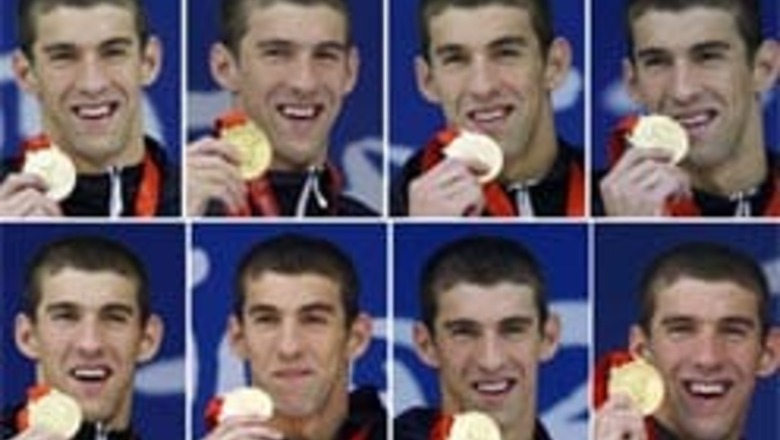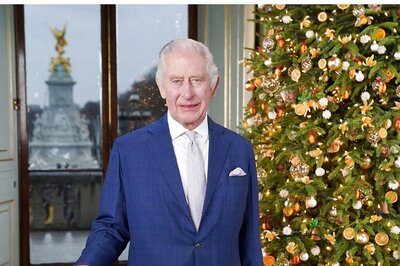
views
Beijing: Winners and losers at the Beijing Olympics:
Winners
Usain Bolt: Never has a sprint king been so aptly named as the streak of yellow lightning from Jamaica who pulled off an unprecedented double-triple of world records and titles in winning the 100m, 200m and 4x100m sprint relay golds.
Little-known before the start of this year, and regarded as being too tall and lanky for the shorter dash, Bolt exploded onto the world scene with a 100m world record in late May and the manner in which he confirmed that in Beijing will go down in Olympic history.
He reckons he can improve his start which could bring the 9.6secs barrier into prospect. His pre- and post- race antics upset IOC chief Jacques Rogge, but he delighted fans, pundits and sponsors alike with his laid-back approach.
Michael Phelps
The Beijing Games started at 8:08 on 08/08/08 in keeping with Chinese beliefs that the number eight brings good luck and it will be the record eight gold medals won by Michael Phelps that will mark these Games forever.
Some of his golds he won easily, others were agonisingly close, but at the end of the day the legendary seven golds won by Mark Spitz in Munich 35 years ago had finally been surpassed.
The unassuming American now holds the record of Olympic titles at 14 and he fully intends to compete in London in four years time when he will be just 27 years old. That could see him bidding to hike his career golds up to an amazing 20.
Chris Hoy
The Flying Scotsman was originally a steam-engine train that smashed world speed records in the last century, Now it refers to the 32-year-old Edinburgh powerhouse who spearheaded Britain's astonishing track cycling campaign which saw them win seven out of the 10 golds on offer.
Hoy, who was left distraught after the IOC scrapped the one kilometer event he won in Athens, worked furiously to turn his formidable four-lap time trial skills into ones with power and acceleration and it paid off as he won the individual and team sprints as well as the keirin, equalling a 100-year-old British Olympic record in the process.
Yelena Isinbayeva
Diva is a word that is overused in the sporting world, but if there is any athlete who merits the description it is Russia's peerless pole vaulter Yelena Isinbayeva.
The former gymnast and Red Army lieutenant pocketed her second straight Olympics gold with consumate ease, clearing 25cm higher than her nearest rival, and then produced a one-woman show of the highest quality and drama.
She failed twice in her bid at a new world record height of 5.05m, but on her third attempt she sailed over triggering one of the most gleeful gold medal celebrations of the Games. She insists she will be back in four years time in London to bid for the treble.
Team China
China completed the Long March to world sporting supremacy on home territory and the toppling of the United States never looked in doubt from the moment that weightlifter Chen Xiexia opened her country's account with the second gold medal of the Olympics.
By the end of the Games, China had made off with 51 golds, well ahead of the Americans. The United States remained ahead in total number of medals won though. China's successes came mainly in lower profile sports such as diving, shooting and table-tennis while success in sports like athletics and swimming remained elusive with just Liu Zige's women's 200m butterfly gold to celebrate for the hosts.
How well the Chinese defend their crown in London in four years time will be fascinating to watch.
Kenenisa Bekele and Tirunesh Dibaba
The fleet-footed duo from Ethiopia underlined their country's domination of long-distance track running by claiming men's and women's 5000m and 10,000m doubles within a day of each other. Both won with consummate ease. Bekele became the first male athlete to do the double since another Ethiopian Miruts Yifter achieved the same feat in the boycotted 1980 Games in Moscow, while Dibaba's accomplishment was a ground-breaker for the women.
Ethiopia's gold rush was a bitter blow to arch-rivals Kenya but the east African running power bounced back with first ever golds in the men's marathon through Samuel Wanjiru and in the women's 800 and 1500 metres through Pamela Jelimo and Nancy Jebet Langat.
Losers
Tyson Gay
Gay started the year as world champion and the leading force in global sprinting alongside Asafa Powell. He left Beijing empty-handed and confused. Gay's preparations for the Olympics were badly hampered by a hamstring injury, but even then few would have predicted he would fail to make it through to the final.
His fall from grace presaged a miserable time for US sprinters as Usain Bolt and the all-conquering Jamaicans won five out of the six sprint golds on offer with Russia taking the women's 4x100m after the Jamaicans dropped the baton.
Hapless handovers also doomed both US sprint relay teams and the powers that be have ordered a major review of all USA Track and Field programs.
Liu Xiang
Hurdler Liu's dream of providing China with the big win they sought in the Olympic Stadium was shattered under the twin burdens of injuries and massive pressure. The signs were there that all was not well before the Games even got underway as the Shanghai Express holed up in the sidings while Cuba's Dayron Robles snatched away his world record.
It still came as a stunning blow to the nation, however, when he pulled up in pain after a false start to his opening heat and marched disconsolately off the track. Liu later apologised to his compatriots and vowed to regain his crown in London in four years time when at 29 he will still be in his prime as a hurdler.
Laure Manaudou
The French swimmer exploded onto the scene as a 17-year-old in Athens four years ago and she supplanted Grand Slam tennis swimmer Amelie Mauresmo as France's most admired woman athlete. But Beijing was a different story.
Her form slumped in the last few months as her love life and wrangles with coaches became a staple of the French gossip columns. It all came home to roost in China where she could only manage seventh place in the final of the 400m freestyle where she was the defending champion, followed by last place in the 100m backstroke final and finally a dismal eighth and last place in the semi-finals of the 200m backstroke after which she tearfully fled for home.
Brazil's footballers
If failing to end the jinx that has seen the Brazilians never having won the men's Olympic title to go with the five World Cups they have won, it was arch-rivals Argentina that sent them packing with a humiliating 3-0 thumping in the semi-finals.
Dunga's players did save some face by defeating Belgium for the bronze medal but their performances in China left the legendary Pele shaking his head.
The Brazilian women went one better and reached the final but once again they fell to the United States and the tears and anguish that the players displayed at the final whistle showed that there was no silver lining for them in defeat.
Roger Federer
The Swiss maestro said he would salvage his season with wins in the Olympics and at the US Open. His stunning quarter-final loss to Fernando Gonzalez in Beijing leaves him with just Flushing Meadows to go this year.
To make matters worse his Spanish nemesis Rafael Nadal on at a canter as he underlined his newly-acquired position as the number one tennis player in the world. Federer has now played in three Olympics and his best performance remains a fourth-place finish in Sydney in 2000.
Curiously, there was some consolation for him when he teamed up with Stanislas Wawrinka to win the men's doubles title for his country. He had hoped for more.
Cuba's boxers
Cuba's proud record in Olympic boxing was dealt a painful knockout blow as the Caribbean island came away empty-handed in terms of gold medals. They had eight boxers out of 10 competing who reached the semi-finals and four made it through to the finals, but not one managed to strike gold - the first time that has happened since 1968 other than 1984 and 1988 when they didn't compete.
At least the Cubans had a legitimate excuse as they had lost five of their best boxers to defections in the 18 months before the Games began.
Regrouping for London in four years time will be high on the lost of priorities -- if they can keep their top talents at home.




















Comments
0 comment